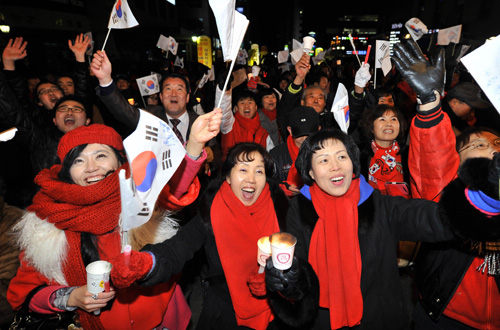|
 |
|
PRESIDENTIAL POSSE: Supporters of South Korean President-elect Park Geun Hye celebrate news of her victory in Seoul on December 19, 2012 (XINHUA/AFP) |
Moderate foreign policy
During incumbent President Lee Myung Bak's administration, South Korea's hard-line policy toward Pyongyang has increased tension on the peninsula. Chinese analysts said Park's new administration will adopt an active and moderate diplomatic policy, which will create an opportunity for regional peace and security.
"Lee followed the Saenuri Party's basic principle of maintaining a close relationship with the United States and keeping a distance from China. In contrast, Park will work to find a balance between China and the United States," Shi said.
Piao Guanghai, another researcher on South Korean studies with the CASS, said Park's election victory was an influential event to South Korea and Northeast Asia at large.
Park speaks fluent Mandarin and has visited China many times, building rich political experience. It is likely that the China-South Korea relationship will further develop, said Piao.
Piao said Park understands China's growing influence in the world, especially in the economic field. China now is South Korea's top trade partner. Bilateral trade totaled $233 billion from January to November 2012, up 3.7 percent year on year, according to China's Ministry of Commerce. China's exports to South Korea and imports from South Korea amounted to $80.5 billion and $152.5 billion respectively.
Park will seek a breakthrough in Seoul-Pyongyang relations, which demands courage and wisdom, said Piao.
Late South Korean President Kim Dae Jung carried out a famous "sunshine policy" toward North Korea during his presidency from 1997 to 2002, greatly easing tension on the peninsula. When he took over in 2008, Lee, however, insisted on a tough policy toward Pyongyang, straining relations between the two sides. Chinese critics said Park will take a moderate approach.
Piao said South Korea needs to promote dialogue between the two sides by ameliorating the Seoul-Pyongyang relationship, while boosting economic cooperation between them. This will benefit both sides, push forward the economic cooperation of Northeast Asia and improve peace and stability in the region, he stressed.
Park took a hard-line stance against North Korea's satellite launch prior to the election. Shi suggested that Park should backpedal on the issue before taking office.
"Now is a good historic opportunity for Park to play a special role on the peninsula, because currently there's very limited space for either China or the United States to play an effective role," said Shi. "Park should deal with the Seoul-Pyongyang relationship from a new starting point."
Shi said that although Pyongyang's recent satellite launch sparked tension in the region, North Korea is unlikely to make similar moves regarding the sensitive nuclear topic in the short term that might worsen relations between the two sides.
"If Park and South Korea seize this precious opportunity and ease its relationship with North Korea, it's expected that Pyongyang could return to the six-party talks. But if this opportunity slips away, it will be very difficult to change the current situation on the peninsula," said Shi.
Email us at: dingying@bjreview.com | 